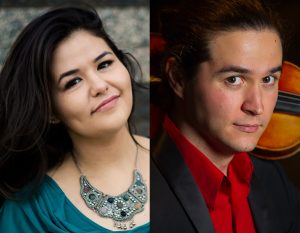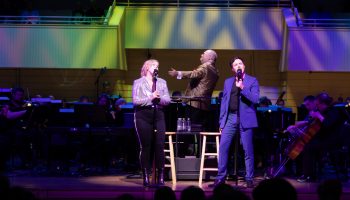Alexandra Switala wouldn’t consider herself “tech-savvy whatsoever,” so a livestreamed performance wasn’t high on her to-do list. Luckily, Robert, her brother and built-in duet partner, had this one covered.

“I am so fortunate to have my closest collaborator be my brother because he’s such a nerd,” Alexandra said. “I mean, he built a computer from scratch in high school. I guess being a geek is coming in handy now.”
Alexandra and her brother, formally known as the “Switala Duo,” will bring “Americana influences” to the CHQ Assembly Video Platform at 4 p.m. EDT Monday, July 20. The duo is partnered with the Sphinx Organization, which holds a competition every year in the Detroit area to encourage minority participation in classical music. Alexandra won the junior division in 2011, the same division Robert won in 2007.
While most people, of course, just consider the United States to be American, we are Mexican-American, so to us, America is also Mexico,” Alexandra said. “You aren’t confined to one place; American music can be pulled from every corner of the world.”
Since making her professional debut in Texas with the Fort Worth Symphony at the age of 13, Alexandra has performed as a soloist with orchestras across the United States, including the New World Symphony, the New York Philharmonic and the Cleveland Orchestra. Robert started playing viola at 14 and is now principal viola of the Sphinx Virtuosi Chamber Orchestra, concertmaster for the Thompson Street Opera Company and faculty at the Des Plaines School of Music.
The afternoon’s program features “soulful and eclectic” American music. The definition of “American,” however, was up for interpretation.
All music is great music if it’s sincere in its presentation and its conviction,” Robert said.
“While most people, of course, just consider the United States to be American, we are Mexican-American, so to us, America is also Mexico,” Alexandra said. “You aren’t confined to one place; American music can be pulled from every corner of the world.”
The pieces that do not fall into the program’s theme will kick off the performance. The program will begin with “fun and perky” selections from Béla Bartók’s 44 Duos for Two Violins, including “Serbian Dance,” “Pizzicato” and “Scherzo.”
“These are all very different sounds, but great sounds in their own way,” Robert said. “All music is great music if it’s sincere in its presentation and its conviction.”
The next three pieces were composed by American composers in the United States, such as Augusta Read Thomas, the longest-serving Mead Composer-in-Residence with the Chicago Symphony, where she worked from 1997 to 2006. The duo will play Thomas’ 2006 “Silent Moon” for violin and viola.
“An overarching theme in this selection is stillness,” Robert said. “It does a beautiful job of portraying the silence before a storm. It’s deeply soulful in that sense.”
“Silent Moon” was commissioned and dedicated to two of their teachers, Roland and Almita Vamos. Robert and Alexandra started studying under the Vamoses at Chautauqua’s School of Music in 2010. Alexandra moved to Chicago in 2011 to continue studying with the Vamoses at the Music Institute of Chicago where the couple teaches in the off-seasons.
“It’s a nice tip of the hat — a tribute to the Vamoses,” Robert said. “It’s a lovely piece for two people who have done so much for us.”
Following the duet are two solo performances. Alexandra will play Jessie Montgomery’s 2014 Rhapsody No. 1 for violin. Montgomery is a fellow Sphinx artist and an “incredible composer,” according to Alexandra. The rhapsody she chose comes from Montgomery’s debut album, Strum: Music for Strings Instrumentation, aimed to be a homage to the tradition of Bach’s solo violin sonatas and partitas.
“Jessie is a Black female composer we wanted to highlight heavily in our programming,” Robert said. “Her love for chamber music and its roots are undeniable, but she’s also an example of someone broadening the definition of what it means to be an American composer.”
Robert will play a solo rendition of Quincy Porter’s 1930 Suite for viola, the only solo work Porter ever composed. Porter co-founded New York City’s American Music Center with American composer Aaron Copland in 1939.
“Nobody ever, ever plays his stuff, which doesn’t make much sense to me because he is one of the gatherers of American music,” he said. “There are a lot of colorful Americana sounds in his compositions that I look forward to playing each and every time.”
The Switalas will finish their performance with Manuel Ponce’s 1938 Sonata en Duo. Ponce is a Mexican composer credited with introducing elements of the folk and popular music of his country to classical composition. Alexandra said that since his death in 1948, Ponce is remembered as the founder of “Mexican musical nationalism.”
“We are really excited about this one because of the Spanish influence it carries,” she said. “It’s just a blast to play overall. It will transcend the computer screen — I just know it.”
With “atonal” and somewhat “shocking” material, Alexandra thinks their program pushes the boundaries of classical music.
“It’s really riveting, but it also tells a story,” she said. “I’ve always thought that Chautauqua audiences will be open to hearing something new if you tell them why it’s beautiful. They open their hearts and their minds to what’s unfamiliar — that’s hard to come by.”




